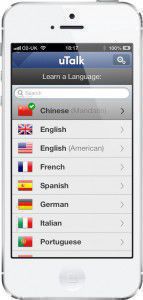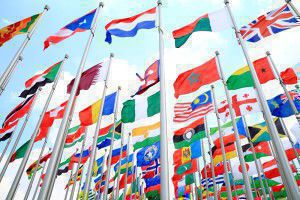How to learn a language on a budget
Why do people give up on learning a language?
There are many answers to this question, of course. Recently, we’ve been running a survey (which you can still complete, if you have two minutes), about language learning, reasons for learning and things that might get in the way. According to the results so far, two of the top answers given to the above question are: lack of time, and lack of money.
 As I know only too well, language classes, private tutors and language CDs or books can quickly become very expensive. Having recently decided to try and upgrade my schoolgirl French, I had a look round at languge tuition and was pretty depressed to see that I would struggle to afford even a few weeks of classes. But never fear, there are plenty of ways to learn even if you can’t afford to go back to school or buy expensive subscriptions.
As I know only too well, language classes, private tutors and language CDs or books can quickly become very expensive. Having recently decided to try and upgrade my schoolgirl French, I had a look round at languge tuition and was pretty depressed to see that I would struggle to afford even a few weeks of classes. But never fear, there are plenty of ways to learn even if you can’t afford to go back to school or buy expensive subscriptions.
So here’s my short guide to how you can learn a language on a budget. Happy learning!
1. Online
There are a tonne of great resources to be found online without even paying a penny. Depending on your language, there are loads of websites for learning grammar, vocab and more. And you can often find really good sites for more advanced learners – I really love RFI for practising French (they have news reports in ‘easy’ French, with text transcriptions). For beginner to intermediate learners, busuu.com has a great programme for 12 languages, including grammar, reading, writing and vocab, and even allows you to chat with native speakers.
2. Media
This probably only applies to intermediate to advanced learners, but it’s my favourite way to practise the languages I already speak. Try watching movies in your language, with English subtitles, or subtitles in the language. Or Google the online version of a newspaper in that language (if I’m feeling very motivated, I read lemonde.fr, spiegel.de or elmundo.es). The radio is also a great tool for language absorption. You can listen to radio in almost any language at tunein.com (and they have a great app for on-the-go listening). Even just listening to some music in another language gets you used to the sound.
3. Flashcards
I used to be obsessed with these when I was at school and uni. In my opinion, this is a great way to cram vocabulary. Either make your own with paper (write the foreign word on one side and the English word or a picture on the other) and test yourself or get a friend to test you. Or, even better, there are some free programs to do just that, which even remember which words you’re weaker on and bring them up more often until you get them right. I used to use this on the computer, but you can get flashcards in app form now too.
4. Find other people to speak to
Ok, I’ve got it easy here because we have a very international office and I’m never short of someone to annoy with my dodgy Spanish… But even if you’re not surrounded by native speakers, you might be able to track down a language partner using a website like totalingua.com that matches you up with an exchange partner. If no one lives in your area, you can always arrange a Skype chat instead of meeting face to face.
5. Apps
There are some amazing free or cheap apps to download on iPhone or Android. I’m using a combination of DuoLingo and uTalk to learn basic Italian. DuoLingo is free and gives you a good grounding in grammar and basic vocab, whilst uTalk features native speakers for all (70 and counting) languages, and has real audio for all the phrases and vocabulary, so I can pick up on the accent and pronounciation as well. I normally play a couple of the games on the bus to work, although I save the recording quizzes for the privacy of my room!
6. Books
If you’re more of a paper and pencil type, then there are plenty of language-learning books on the market, and they’re mostly cheap to buy, or you can track some down second hand. I think there’s something to be said for having a paper dictionary if you’re a serious language learner (what if leo.de is down!?) – even if you just decorate your shelves with them to look intellectual (or is that just me?).
Have you got any more tips for people learning a language on a budget?
Alex
Next week: our guide to learning a language when you’re short of time. If you’ve got any particularly useful tips you’d like to see included, please let us know below!
Goal! around the world [Infographic]
Sometimes one word is all you need… With the World Cup getting underway today, here’s how each national team says that all-important word, ‘goal’.
You can find this and lots more in our language learning app, uTalk – available to download and start learning right now from the App Store. So whether you’re watching the football at home or away, you’ll always be prepared.
(There are lots of non-football related words in there too, for those of us with other interests!)
Please do share the infographic with friends and tell us how you’ll be shouting ‘Goal!’ this World Cup 🙂
Embed This Image On Your Site (copy code below):
10 sport stars who speak other languages
 It can often feel like life is all about sport, whether we like it or not. But have you ever wondered how good sports stars are at languages?
It can often feel like life is all about sport, whether we like it or not. But have you ever wondered how good sports stars are at languages?
It turns out, pretty good. Like anyone who has to travel a lot for their work, athletes often find knowing only their native language isn’t enough. Here are 10 great examples of sports stars who speak more than one language.
Gary Lineker
Besides English, the former footballer learnt Spanish while he was playing for Barcelona, and picked up some Japanese when he later moved to Nagoya Grampus Eight. He’s now a passionate ambassador for languages in schools, saying in an interview with TES last year, ‘the learning of languages, for me, will always be helpful for the vast majority at some stage in their life’.
Roger Federer
Not content with winning a frankly quite ridiculous 17 Grand Slam titles, the Swiss tennis player also speaks four languages fluently – his native Swiss German along with French, English and German. He’s known for his ability to switch effortlessly between languages in interviews and press conferences and can quite comfortably answer journalists’ questions in their own language, a feat some of his fellow tennis players can’t keep up with. Wouldn’t be the first time.
Tom Daley
The British diver recently got an A in his Spanish A-level (congrats, Tom!), and makes good use of his language skills when in Mexico, where he spends a lot of his time. Here’s a video of him showing off his Spanish.
Jonny Wilkinson
Here in England, Jonny Wilkinson is known (at least by me) as that guy who’s pretty good at drop goals. But he’s also a bit of a superstar in France, where he’s been playing for Toulon since 2009. He’s now fluent in French and was awarded honorary citizenship of Toulon earlier this week – giving his acceptance speech in the local language, of course.
Fernando Alonso
The Spanish Formula One racing driver speaks an impressive four languages – Spanish, Italian, English and French. And in case that’s not enough, he’s apparently working on Russian too.
Arsene Wenger
The Arsenal manager is well known for his interest in languages, speaking French, English, German, Spanish, Italian and Japanese. Like Gary Lineker, Wenger’s also known as an ambassador for languages, and last year he was voted Britain’s first Public Language Champion by readers of The Guardian. In this video he explains why languages are so important.
Novak Djokovic
Never one to let Roger take all the glory, fellow tennis champion Novak Djokovic speaks five languages – Serbian, English, German, Italian and French. He studied English and German at primary school, and learned Italian when he worked with coach Riccardo Piati. In an interview with Tennis Talk in 2013, he said, ‘We have a saying in our country: The more languages you know, the more is your worth as a person. I like to understand what people are saying wherever I am, at least to pick up a few phrases of those languages.’
Paula Radcliffe
Long-distance runner Paula Radcliffe has a first-class degree from Loughborough University in European Studies, and speaks French and German fluently. She now lives in Monaco with her husband and two children, who are both bilingual, attending a French school but also fluent in English.
Cesc Fabregas
Another Barcelona footballer, Fabregas speaks four languages – Spanish, Catalan, English and French, and his Twitter feed is multilingual. When asked about his language skills in 2005, he replied, ‘These days you have to keep studying, not least because my mum tells me so.’ Words to live by.
Daniela Hantuchova
And finally, another tennis player, because tennis is my favourite. Daniela Hantuchova, from Slovakia, is by all accounts a very talented lady. Besides her tennis career, she’s also a trained classical pianist, and speaks – wait for it – six languages: Slovak, Czech, English and German fluently, and some Croatian and Italian.
Does anyone else feel like a bit of an underachiever now, or is it just me?
If you know any other examples of sports stars who speak other languages, please tell us about them in the comments.
A little language goes a long way
As marketing manager here at EuroTalk, it’s my job to tell everyone how great our products are. But from time to time, I need to use them for myself and I get reminded all over again just how useful they are.
 Last weekend I spent a few days in Naples, Italy. I was determined before I left to try and speak a little bit of Italian; after all I spend most of my time telling other people they have to speak the local language, not to mention it just seemed like the polite thing to do. As it turned out, it was also quite necessary because to our surprise, although it’s a pretty touristy area, not many people spoke English. Fortunately I’d come prepared with uTalk on my phone, and it turned out to be invaluable.
Last weekend I spent a few days in Naples, Italy. I was determined before I left to try and speak a little bit of Italian; after all I spend most of my time telling other people they have to speak the local language, not to mention it just seemed like the polite thing to do. As it turned out, it was also quite necessary because to our surprise, although it’s a pretty touristy area, not many people spoke English. Fortunately I’d come prepared with uTalk on my phone, and it turned out to be invaluable.
I left home with no Italian at all, apart from the basics – ‘ciao’, ‘grazie’ and ‘per favore’ were the first words I tried out (all included in the free version of the app). I’d also learnt the numbers up to three in advance, so I could ask for a table in restaurants. Pretty soon I realised I also needed to know ‘una bottiglia d’acqua’ because it was quite hot and sunny (when it wasn’t pouring with rain), and some higher numbers so I knew how much money I was being asked for. So out came uTalk for a quick revision session.
The first time we went to a restaurant, the waiter spoke some English and somehow identified us as Brits the moment we walked in, so my contribution was fairly limited, although I was insistent that I wanted to say what I could in Italian. The following night, I managed to ask for the bill, thanks to a quick check of my phone. And by the last night, I was able to order dessert by describing what I wanted (‘una torta de fragole’) and was astonished and delighted when the waiter brought me exactly what I wanted without any confusion. (We also got free limoncello at that restaurant – although I think they might have given that to everyone.)
Our main challenge in Naples was figuring out the ‘funicolare’ – which, by the way, is the weirdest way I’ve ever travelled. (For those who aren’t familiar, it’s basically a little train/car that carries people up and down the mountain – but on the inside and at a 45 degree angle. It’s quite surreal.) I’ll admit there was a bit of English used when I asked the man in the station how it all worked the first time, but then after another quick check of uTalk, I managed to buy us three tickets (‘bigliettos’) from the slightly intimidating lady in the little shop next door.
None of my conversations were particularly long or profound, but every time I said something in Italian and the person I was speaking to understood me, I gained a little bit of confidence. By the time I left, I was quite looking forward to these little exchanges, and was a bit disappointed if someone talked to me in English. There were a lot of Brits around, as we were all there for the Davis Cup tennis (the less said about that the better) and we witnessed a few fellow tourists adopting the ‘talk louder in English’ approach, not to mention quite a lot more standing around looking very confused in the funicolare station. So it was quite satisfying to know that we’d made the effort; the locals I spoke to certainly seemed to appreciate it. And yes, there were a couple of occasions when they thought I knew more than I did and started chatting away in rapid Italian, but somehow I managed to fumble my way through it (‘non capisco’ – I don’t understand – is another important phrase to learn).
It’s always useful to learn a few words before you leave for your holiday, but for me the most useful thing about uTalk was that I always had access to the vocabulary – written and spoken – whenever I needed it. I wouldn’t necessarily have thought to look up ‘strawberries’ and ‘cake’ before I left, for example, so without uTalk I might have missed out on this amazing dessert. And that would have been a tragedy.
Languages for the future: the top ten
A recent report by the British Council has laid out the ten most important languages for the UK’s future, in political, economic, educational and cultural terms.
According to the report, the ten most important languages, in order, are: Spanish, Arabic, French, Mandarin, German, Portuguese, Italian, Russian, Turkish and Japanese. I read this list with a certain amount of smugness that I speak Spanish, German and French – although my knowledge of key languages such as Mandarin and Arabic is, sadly, next to nothing. So feel free to give yourself a pat on the back if you can speak, or are learning, one of those ten languages.
 Unfortunately, the report also indicated that the numbers of UK residents actually learning these languages, especially the ones not taught in schools, are very low. On a positive note, around 15% of people can hold a conversation in French. However, only 6% are able to do so in German, 4% in Spanish and 2% in Italian. But the figures for the other languages are as low as 1%.
Unfortunately, the report also indicated that the numbers of UK residents actually learning these languages, especially the ones not taught in schools, are very low. On a positive note, around 15% of people can hold a conversation in French. However, only 6% are able to do so in German, 4% in Spanish and 2% in Italian. But the figures for the other languages are as low as 1%.
Perhaps one of the problems is that Mandarin, Japanese, Russian and Arabic all require learners to pick up another script. This might seem daunting, but is actually really exciting. Just being able to read simple words in another script gives you a huge sense of achievement, and you’d be surprised how quickly you can begin to decipher words from what previously looked like squiggles.
Hopefully if you’re reading our blog you already know the importance of language-learning, and that picking up a new language is an adventure rather than a chore! But maybe this list will give you an idea about which language you fancy picking up – maybe it’s time to start reviving your A-level French? Or be brave and give Arabic a try? Personally, I’m working on adding Italian to my list, which is proving interesting as I lapse back into Spanish as soon as I don’t know a word!
The report recommends a much greater focus on languages in schools and that businesses should invest in language training for languages that are useful in their industry. But don’t worry if your school days are behind you – it’s never too late to learn a new language!
Alex


